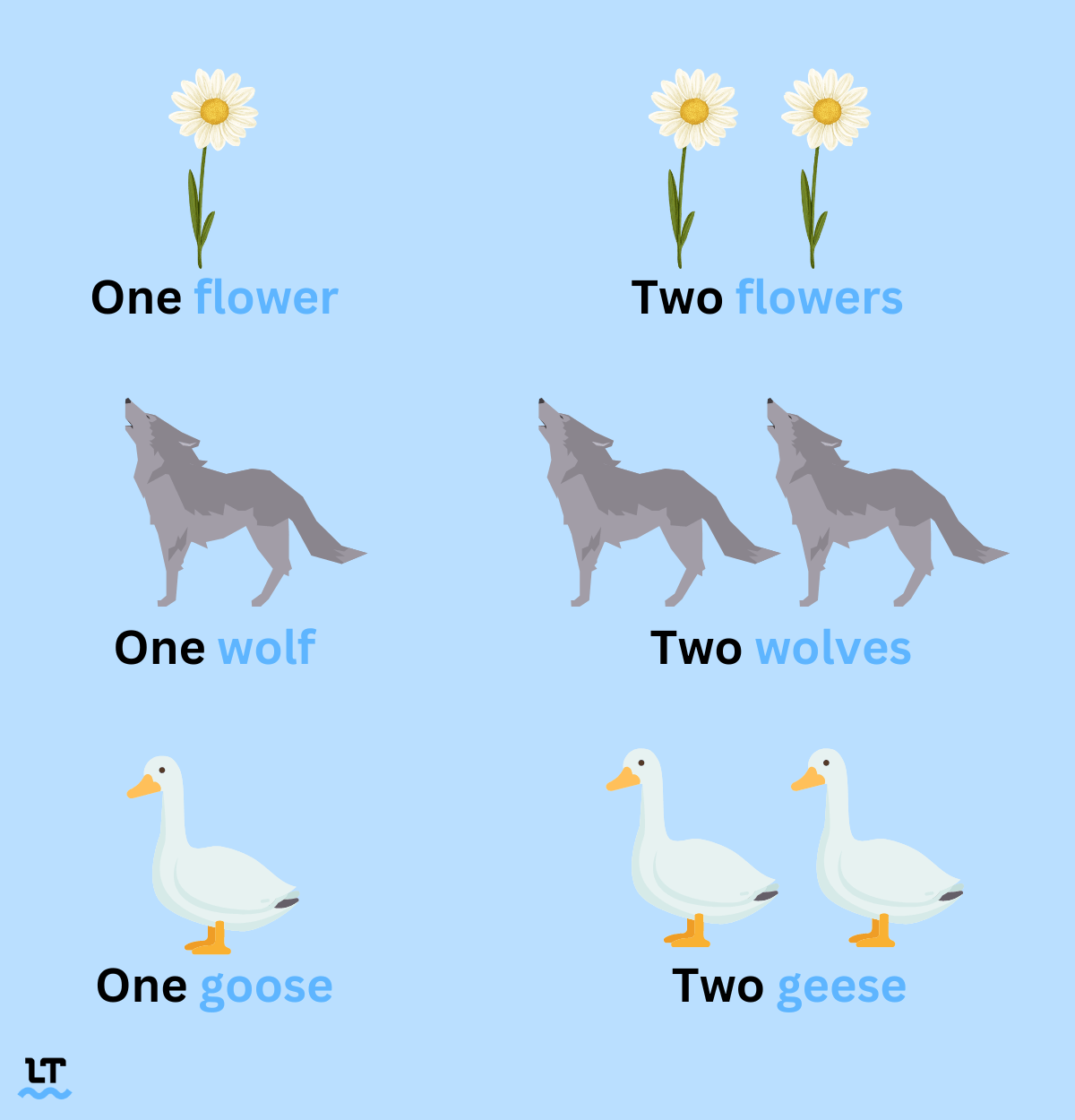Plural Nouns: Quick Summary
A plural noun refers to more than one person, place, thing, or idea. For example, flower is singular, but flowers is plural.
Regular nouns become plural by adding “–s” or “–es” to the singular noun, while irregular plural nouns have unique spellings and do not follow the standard pattern.
What’s a Plural Noun?
A noun is a part of speech that indicates a person, place, thing, or idea. While singular nouns refer to a single entity, plural nouns refer to multiples.
- Singular: dog, umbrella, car, table, pen, tree, color
- Plural: dogs, umbrellas, cars, tables, pens, trees, colors
You’ll notice that the nouns above become plural simply by adding “–s” to them. Certain nouns do not follow this standard, but instead have their own guidelines.
Below, we’ll review all the rules regarding forming plural nouns in English. You can also use LanguageTool's Grammar Checker to ensure you're using plural nouns correctly.

Learn How To Form Plural Nouns
As with anything in English, keep in mind that there can be several exceptions to these rules.
1. Most nouns become plural simply by adding “–s” to the end of the word.
lamp → lamps
cat → cats
hand → hands
2. Nouns ending in “–s,” “–ss,” “–x,” “–z,” “–ch” or “–sh” usually become plural by adding an “–es” to the singular form.
bus → buses
cross → crosses
fox → foxes
waltz → waltzes
church → churches
brush → brushes
3. Some words that end in “–s” or “–z” require that you double those letters before adding the “–es” to form the plural.
quiz – quizzes
4. For nouns that end in a consonant plus “–y,” change the “–y” to “–ies.”
baby → babies
city → cities
fairy → fairies
5. Nouns that end in a vowel plus “–y” become plural by adding “–s” to it.
toy → toys
boy → boys
ray → rays
6. Some nouns that end in “–fe” become plural by changing the “–fe” to “–ves.”
life → lives
wife → wives
knife → knives
7. Nouns that end in “–o” typically get “–es” added to them to form the plural.
potato → potatoes
tomato → tomatoes
8. For singular nouns that end in “–us,” the plural ending is usually changed to “–i.”
cactus → cacti
fungus → fungi
octopus → octopi
9. If the singular form of the noun ends in “–sis”, the plural gets changed to “–ses.”
analysis → analyses
basis → bases
crisis → crises
10. Some singular nouns that end in “–on,” get these letters replaced by “–a” to become plural.
criterion → criteria
phenomenon → phenomena
11. Nouns that end in “–um” become plural by replacing “–um” with “–a.”
bacterium → bacteria
datum → data
12. Compound nouns usually form the plural by adding “–s” to the main word.
attorney-at-law → attorneys-at-law
brother-in-law → brothers-in-law
editor-in-chief → editors-in-chief
13. Some nouns remain the same whether they’re singular or plural.
aircraft → aircraft
moose → moose
sheep → sheep
14. Irregular nouns do not follow any specific rules.
child → children
foot → feet
goose → geese
man → men
mouse → mice
person → people
tooth → teeth
woman → women
Using Plural Nouns Correctly
As you can tell, there are plenty of rules you have to remember to correctly use plural nouns. There are even nouns that don’t follow any rules. For these, if you’re unsure about what is the plural form, you can check a dictionary or, better yet, use LanguageTool.
LanguageTool is an advanced writing assistant that corrects various types of errors, including incorrect proper nouns. The best part about it? It’s free to use. Give it a try!

